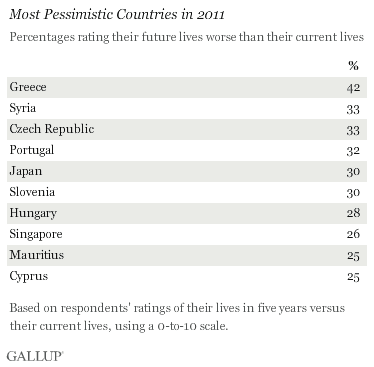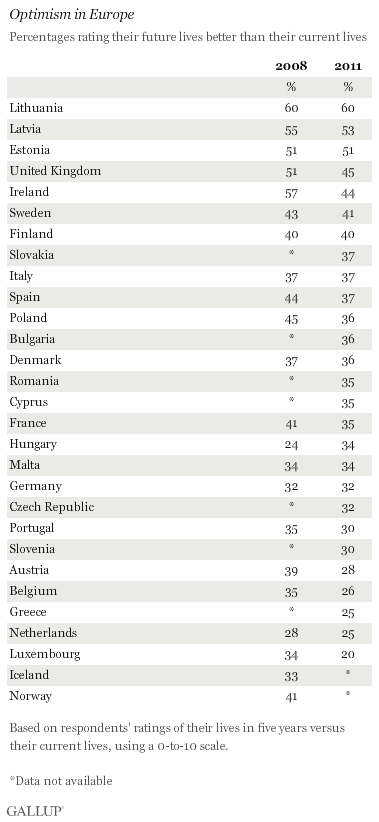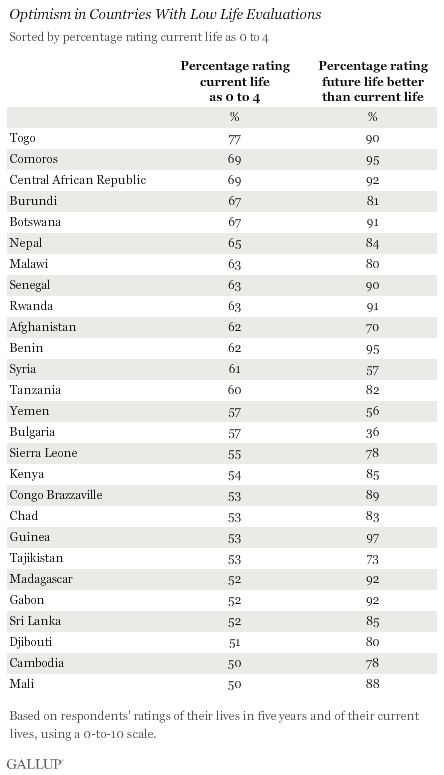BRUSSELS -- The Greek government's promise of no new austerity measures this year may offer some much-needed hope to its citizens, whom Gallup surveys show are the most pessimistic in the world about the direction of their lives. More than four in 10 Greeks (42%) in 2011 expected their lives in five years to be worse than they were at the present time. Syria, the Czech Republic, and Portugal are the only other countries worldwide where at least one in three people rated their future lives worse than their current lives.

The pessimism among Greeks bucks a global trend -- people in most countries tend to expect their lives in five years to be better than their current lives, whether they rate their lives highly or not. In Greece, 25% in 2011 expressed such optimism, compared with a median of 36% in Europe and 66% worldwide. Greeks' pessimism likely reflects the political and economic uncertainty they have been living with for the past several years. The new Greek government, which formed in June, was the country's first in 222 days.
Gallup asks respondents to rate their current and future lives on a ladder scale with steps numbered from 0 to 10 based on the Cantril Self-Anchoring Striving Scale. Comparing respondents' ratings of their current and future lives, Gallup labels those who rate their future lives higher than their current lives as optimistic and those who rate their future lives lower than their current lives as pessimistic.
Optimism is often found among those with low current life ratings, as is the case in less developed nations. In countries where residents generally rate their lives poorly, people tend to expect their lives to improve, likely because they cannot fathom their lives getting worse. In countries where residents already give their current lives high ratings, people are somewhat more likely to expect their lives to stay the same. Technically, those who rate their current lives as a 10 have no chance of being termed optimistic, as their future life rating cannot exceed that score.
Higher life evaluations are generally found in wealthier and more developed countries. Gallup recorded the highest current life ratings in northern Europe, Canada, Australia, and Israel, where more than three in four people rated their current lives as a 7 or higher. Gallup typically finds that people in wealthier countries are also more likely to be "thriving" -- that is, they give high ratings to their current and future lives.
Optimism Declines in Hard-Hit Southern Europe
About one in three residents in many European countries believed that their future lives would be better than their current lives. Generally, the percentage of those who expected their future lives to be better either stayed the same or decreased slightly between 2008 and 2011. The percentage of those who rated their future lives worse than their current lives stayed relatively stable in most countries.

The data suggest that while Europeans overall are not expecting any rapid improvement, they are confident in their countries' economic stability in the near future. In southern European countries facing severe economic crises, such as Portugal, the percentage of optimists declined between 2008 and 2011.
Countries With Low Current Life Evaluations Often Most Optimistic
In countries where people tend to rate their current lives poorly (0 to 4), nearly all residents expect their lives to improve. For example, more than 90% of residents in a number of sub-Saharan African countries rated their future lives higher than their current lives.

Implications
Greeks' hope for the future reached a low point in 2011. This lack of optimism is potentially an even more serious concern than current low life evaluations, as pessimism and hopelessness can have serious implications for social stability. In European countries that have reported relatively high life satisfaction but are undergoing serious socioeconomic crises, hope for the future has diminished. Greece's newly elected government will face the difficult task of giving Greeks much more to be hopeful about.
Worldwide, there is generally a lot of optimism, even in countries where majorities currently rate their lives negatively. This suggests that despite their current situations, there is still an abundance of hope -- which leaders would be wise to tap into as they seek to move their countries forward.
For complete data sets or custom research from the more than 150 countries Gallup continually surveys, please contact SocialandEconomicAnalysis@gallup.com or call 202.715.3030.
Survey Methods
Results are based on telephone and face-to-face interviews with approximately 1,000 adults per country in 148 countries and areas, aged 15 and older, conducted in 2011. For results based on the total sample of national adults, one can say with 95% confidence that the maximum margin of sampling error ranged from a low of ±3.5 percentage points to a high of ±4 percentage points. The margin of error reflects the influence of data weighting. In addition to sampling error, question wording and practical difficulties in conducting surveys can introduce error or bias into the findings of public opinion polls.
For more complete methodology and specific survey dates, please review Gallup's Country Data Set details.

